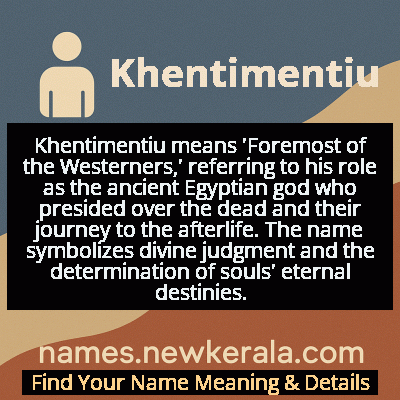Khentimentiu Name Meaning & Details
Origin, Popularity, Numerology Analysis & Name Meaning of Khentimentiu
Discover the origin, meaning, and cultural significance of the name KHENTIMENTIU. Delve into its historical roots and explore the lasting impact it has had on communities and traditions.
Name
Khentimentiu
Gender
Male
Origin
Egyptian
Lucky Number
5
Meaning of the Name - Khentimentiu
Khentimentiu means 'Foremost of the Westerners,' referring to his role as the ancient Egyptian god who presided over the dead and their journey to the afterlife. The name symbolizes divine judgment and the determination of souls' eternal destinies.
Khentimentiu - Complete Numerology Analysis
Your Numerology Number
Based on Pythagorean Numerology System
Ruling Planet
Mercury
Positive Nature
Adventurous, dynamic, curious, and social.
Negative Traits
Restless, impatient, inconsistent, prone to indulgence.
Lucky Colours
Green, white.
Lucky Days
Wednesday.
Lucky Stones
Emerald.
Harmony Numbers
1, 3, 9.
Best Suited Professions
Sales, marketing, travel, entertainment.
What People Like About You
Versatility, charisma, adventurous spirit.
Famous People Named Khentimentiu
Khentimentiu
Ancient Egyptian deity
Original god of the dead before Osiris, worshipped at Abydos
Khentimentiu-priest
High Priest
Oversaw the primary cult center of Khentimentiu in Abydos
Khentimentiu-ankh
Royal Scribe
Recorded important funerary texts and rituals dedicated to the god
Name Variations & International Equivalents
Click on blue names to explore their detailed meanings. Gray names with will be available soon.
Cultural & Historical Significance
His cult center at Abydos was among the most important religious sites in ancient Egypt, and he was often depicted as a jackal or jackal-headed figure, a representation later adopted by Anubis. The transition from Khentimentiu to Osiris as the primary god of the dead represents a major evolution in Egyptian theology, with Khentimentiu gradually being absorbed into the Osiris mythos while maintaining his significance as a precursor deity. His role established the Egyptian belief in a measured, just afterlife where one's earthly deeds determined eternal fate.
Extended Personality Analysis
Individuals named after Khentimentiu are often perceived as having a profound sense of justice and moral responsibility, reflecting the god's role as a divine judge. They tend to be serious, contemplative, and deeply philosophical, with a natural inclination toward understanding life's deeper meanings and the consequences of human actions. These individuals often possess strong leadership qualities combined with a protective nature, particularly toward those they consider under their care or responsibility.
There is typically a mysterious or reserved quality to those bearing this name, much like the enigmatic nature of death itself that Khentimentiu governed. They may demonstrate exceptional wisdom in difficult situations and show remarkable ability to weigh complex moral dilemmas. However, this seriousness can sometimes manifest as aloofness or emotional distance, as they maintain the impartial demeanor of a judge. Their strength lies in their ability to see the bigger picture and make decisions based on long-term consequences rather than immediate gratification.
Modern Usage & Popularity
In contemporary times, Khentimentiu is extremely rare as a given name and is primarily used in academic, historical, or Egyptology-focused contexts. The name occasionally appears in fictional works, particularly in historical novels, fantasy literature, or games with Egyptian mythological themes. Some parents with deep interest in ancient Egyptian culture or mythology may choose this name for its historical significance and unique sound, though it remains unconventional. The complexity and length of the name make it challenging for everyday use in most modern societies, limiting its adoption primarily to symbolic or scholarly purposes rather than practical naming conventions.
Symbolic & Spiritual Meanings
Khentimentiu symbolizes the eternal concepts of judgment, destiny, and the transition between life and death. As the measurer of souls, he represents the idea that all actions have consequences and that justice extends beyond mortal life. The name carries profound symbolism of protection during life's most significant transitions and the wisdom required to navigate spiritual journeys. It embodies the balance between mercy and justice, reflecting the Egyptian belief in ma'at (cosmic order and truth). The jackal imagery associated with Khentimentiu further symbolizes guidance through darkness and protection in unknown realms, making the name a powerful representation of spiritual guardianship and moral accountability.

